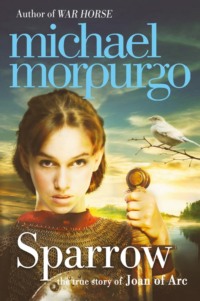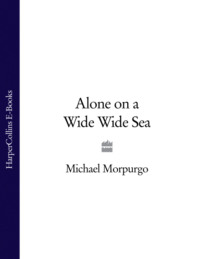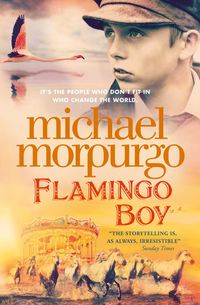
Полная версия
Listen to the Moon
As Jim scanned the island for any sign of life – footprints on the sand, the telltale smoke of a fire perhaps – all the stories about St Helen’s came back to him. He remembered landing there before, a few times. He had walked the length and breadth of it. It was no more than half a mile from end to end, a few hundred yards across the middle, an island of bracken and brambles and heather, a shoreline of great grey boulders and pebbles, with that one spit of steep, shelving sand, and the great rock he remembered so well rearing up behind the Pest House. The Pest House itself had long since fallen into ruin, roof and windows gaping, walls crumbling. But the chimney was still standing.
Jim had gone there first as a small boy, with his father, collecting driftwood for the fire, piling it up on the beach to bring home, or scouring the beach for cowrie shells, ‘guinea money’ as they called it. He’d climbed the rock once with his father, dared himself then to climb it again on his own, got to the top, but had been scolded for it by his father, and told never to do it again without him.
Jim had never really liked the place even as a small boy, had never felt at ease there. St Helen’s had seemed to him even then an abandoned place, a place of lost souls, of ghosts. There was something dark and sad about the island, and he’d thought that long before he’d ever been told the stories. Over the years he had learnt about its grim history bit by bit, how once long ago it had been a holy island, where monks, seeking solitary, contemplative lives, had lived out their years. The ruins of their chapel were still there. And there was, he knew, a holy well just beyond the Pest House – his mother had told him that much. He’d gone looking for it once with her in among the bracken and the brambles, but they had never found it.
But it was the story of the Pest House itself, why it had been built, and how it had been used, that had always troubled him most – so much so that he had never told Alfie about it. There are some stories, he thought, too terrible to pass on. In years gone by, in the days of the great sailing ships, St Helen’s had once been a quarantine island. To prevent the spread of disease, any sailor or passenger on board, who had fallen sick, with yellow fever or typhoid, or some other infectious illness, was put off on St Helen’s, to recover if they could, but much more likely to live out their last wretched days in the Pest House. The sick and dying had simply been left there in isolation, abandoned, and with little hope of survival. All his life Jim had been horrified at the thought of it. Ever since he’d been told about that Pest House, he had thought of St Helen’s as a shameful place, an island of suffering and death, to be avoided if at all possible.
Quite definitely now, and there could no longer be any doubt about it, Jim was hearing the sound of a child crying. Alfie was sure of it too. Neither said a word. The same unspoken thought occurred to both of them then. They had heard tales of ghosts living on St Helen’s – everyone had. Scilly was full of ghost stories. There were the ghosts on Samson Island, the ghost of King Arthur out on the Eastern Isles, and everywhere, all over the islands, there were stories of the spirits of stranded sailors, pirates, drowned sailors. Stories, they told themselves, just stories.
Coughing interrupted the whimpering. This was no ghost. There was someone on the island, a child, a child wailing, whimpering, and still coughing too. It was a cry for help they could not ignore. As they hauled in their lines, in a great hurry now, Alfie found there were three mackerel dangling on his hooks. He hadn’t even felt they were there. But the fish didn’t matter any more. Jim pulled up the anchor, and Alfie rowed hard for the shore. A few strong pulls and they felt the boat beaching. They leapt over the side into the shallows and hauled the boat up higher on to the sand.
Standing on the beach, they listened once again for the sound of the child. For some reason, they found themselves talking in whispers. All they could hear was the sea lapping softly behind them and the piping of a pair of oystercatchers that were flying off low and fast, their wingtips skimming the sea.
“Can’t hear nothing, can you?” Jim said. “Can’t see nothing neither.” He was beginning to wonder now if he had imagined the whole thing, if his hearing had deceived him. But the real truth, and Jim knew it, was that he did not want to venture any further. At that moment he was all for getting the boat back into the water, and rowing home. But Alfie was already running up the beach towards the dunes. Jim thought of calling him back, but he didn’t want to shout. He couldn’t let his son go on alone. He took off his jacket and laid it over his catch in the bottom of the boat, to hide their fish from any sharp-eyed, marauding gulls, and then, reluctantly, followed where Alfie had gone, up over the dunes, towards the Pest House.
A chill came over Alfie as he stood on top of the dunes, looking up at the Pest House, and he knew it wasn’t only the cold. Gulls, hundreds of them, the island’s silent sentinels, were watching him from rocks everywhere, from the walls of the Pest House, from the chimney, from the sky above. After a while, Jim was at his side, and breathless.
Alfie called out. “Anyone here?” There came no answer.
“Who’s there?”
Nothing.
A pair of gulls dived on them then, screeching and wheeling away, first one then another. The rest glared at them darkly. The message was unmistakable. You are not welcome here. Get off our island.
“There’s no one here, Alfie,” Jim whispered. “Let’s go home.”
“But we heard someone, Father,” Alfie said. “I know we did.”
Becoming more fearful now with every passing moment, it was Jim who called out this time. His whole instinct was to turn away, get to the boat fast and go from this place at once. But at the same time he needed to persuade himself that there was no child on the island, that Alfie was wrong, that they must have been imagining the whole thing. They both called out now, echoing one another.
Closer, and quite unmistakable, came the same whimpering as before, but more muffled, stifled. There could be no doubt about it. It was the voice of a child, a child who was terrified, and it was coming from inside the Pest House.
Jim’s first thought was that it had to be some local child who had gone out fishing maybe and had some sort of accident, lost an oar perhaps, or fallen overboard. It wasn’t so long ago, after all, that he had rescued a young lad from the water after the boy had got into trouble out in a boat in Tresco Channel. He’d tripped and gone overboard, and was being swept out to sea by the current. This one had been washed up on St Helen’s – there was no other explanation he could think of. But if any child had been missing then surely he’d have heard about it. The alarm would have been raised all over the islands. Everyone would have been out looking. He couldn’t understand it.
Alfie had already gone on ahead of him up the track towards the Pest House, calling out to whoever was in there, softly, as reassuringly as he could. “Hello. S’only me. Alfie, Alfie Wheatcroft. I got my father with me. You all right, are you?” There was no reply. Both of them stopped outside the doorway, uncertain now as to what to say or do.
“We’re from Bryher,” Jim went on. “You know us, don’t you? I’m Alfie’s father. What you doing over here? Tipped yourself out of a boat, did you? Easily done. Easily done. You must be half frozed. We’ll have you out of here in a jiffy, get you back home, cup of nice warm tea, tatty cake, and a hot bath. That’ll shiver the cold out of you, won’t it?”
As Alfie stepped tentatively through the doorway into the ruins of the Pest House, the whimpering stopped. There was no sign of anyone inside, nothing but bracken and brambles. At the far end of the building, in under the chimney, there was a fireplace, covered in dried bracken, a thick carpet of it, almost as if someone had been making a bed.
A sudden bird flew up out of a niche in the wall, an explosion of fluttering that set Alfie’s heart pounding. He pushed his way through the thick undergrowth that had long since made the ruins their own, brambles tearing at his shirt and trousers as he passed. Jim held back at the doorway. “No one here, Alfie,” he whispered. “You can see there isn’t.”
But Alfie was pointing into the corner of the fireplace, and waving his hand at his father to be quiet.
“Don’t you worry none,” Alfie said, treading softly as he went, and slowly. “We’ll have you out of here and home before you know it. We got our boat. Won’t hurt you none, promise. S’all right, honest. You can come out now.”
He had seen a face, a bone-white face, peering through the bracken, a child, a girl, hollow-cheeked, and with dark lank hair down to her shoulders. She was cowering there in the corner of the building, her fist in her mouth, her eyes staring up at him, wide with terror. She had a grey blanket round her shoulders. Her face was tear-stained, and she was shaking uncontrollably.
Alfie crouched down where he was, keeping his distance – he did not want to alarm her. He did not recognise her. If she had been from the islands, he would have known her for certain – he knew all the children on Scilly, everyone did, whichever island they came from. “Hello?” he said. “You got a name then, have you?” She shrank from him, breathing hard, coughing again now, and shivering under her blanket. “I’m Alfie. You needn’t be afeared of me, girl.” She was staring at Jim now, breathing hard. “That’s Father. He won’t hurt you any more’n I will. You hungry, are you? You been here long? You got a terrible cough on you. Where d’you come from then? How d’you get here, girl?” She said nothing, simply crouched there, frozen in her fear, her eyes darting wildly from Jim to Alfie, from Alfie to Jim. Alfie reached out slowly, and touched her blanket. “It’s wet through,” he said.
Her bare feet were covered in sand and mud, and what little he could see of her dress was nothing but tatters and rags. There were empty limpet shells scattered all about her feet, and a few broken eggshells, gulls’ eggs they were. “We got mackerel for tea back home,” he went on. “Mother does it beautiful, rolled in egg and oats, and we got bread-and-butter pudding for afters too. You’ll like it. We got our boat down on the beach. You want to come with us?” He inched his way towards her, holding out his hand. “Can you walk, girl?”
She sprang up then like a frightened fawn, leapt past him and was stumbling through the bracken towards the doorway. She must have tripped because she suddenly disappeared into the undergrowth. Jim found her moments later, lying face down, unconscious. He turned her over. She was bleeding profusely from her forehead. He leaned over her. There were scratches and cuts all over her legs. One ankle was swollen and bruised. She wasn’t breathing. Alfie was there on his knees beside her.
“Is she dead, Father?” he breathed. “Is she dead?” Jim felt her neck. He could feel no pulse. With panic rising in his chest, he remembered then how Alfie had fallen once down on to rocks when he was little, how he’d run all the way home with Alfie in his arms, quite sure he must be dead. He remembered how calm Mary had been, how she had taken charge at once, laid Alfie out on the kitchen table, put her ear to his mouth and felt his breath on her skin. He did the same now, put his ear to the girl’s mouth, felt the warm breath, and knew there was life in her yet. He had to get her home fast. Mary would know what to do with her.
“You get to the boat, Alfie,” he said. “Quick. I’ll bring her.”
He picked her up, and ran out of the Pest House, along the path to the dunes. She was light and limp and damp in his arms. He could feel she was little more than skin and bones. By the time he got there, Alfie had the boat in the water. He was standing in the shallows, holding it. “You get in, son,” Jim said. “You look after her. I’ll row.” They wrapped her in Jim’s coat, and laid her down with her head on Alfie’s lap. “Hold her close,” Jim told him. “We got to keep her warm as best we can.” He pushed off then, leaping into the boat, and gathering the oars almost in one movement.
Jim rowed like a man possessed out into the swell of the open ocean past the lighthouse on Round Island, and at long last into the calm of Tresco Channel. Every few moments as he rowed, he’d glance down at the girl as she lay there in Alfie’s arms, her head bleeding, her eyes closed. Jim could see no life in her. She was sleeping as if she would never wake.
Alfie talked to her all the time; he hardly stopped. Holding her tight to him as the boat reared and rolled through the waves, he kept calling to her, willing her to wake up and open her eyes, telling her it wouldn’t be long now, that she’d be all right. And sometimes Jim would join in too, whenever he could find the breath to do so, begging her to live, pleading with her, yelling at her even. “Wake up, girl! For Chrissake, wake up! Don’t you dare go and die on us, you hear. Don’t you dare!”

ALL THE WHILE, AS JIM pulled for dear life, straining his every sinew with each stroke, the girl lay there, lifeless, in the boat, her head cradled on Alfie’s lap, as pale as death. He didn’t want to keep asking Alfie how she was, if she was still alive, because he could tell how anxious and upset his son already was. Jim longed to stop rowing, just for a moment, to see for himself if she was still breathing, but he knew he had to keep going, to get the girl back to Bryher, and to Mary, as fast as he could. Mary would know what to do, he told himself. Mary would save her.
Never had it taken so long to row up Tresco Channel, Alfie thought. He was quite sure by now that the girl must be dead, so much so that he could hardly bring himself to look at her. Close to tears all the time, he did not trust himself to speak. He kept catching his father’s eye, then looking away fast. He could not tell him how cold she was in his arms, how still, that she was gone.
Wind and current and exhaustion were slowing Jim all the way. As he rowed into Green Bay, he was yelling for help with what little breath he had left. Dozens of islanders were hurrying along the beach, Mary among them, along with a gaggle of excited children, back from school by now, running along behind. Only Peg, the island’s workhorse, seemed unconcerned at their arrival, intent as she was on browsing the dunes.
As Jim brought the boat in to the shore, everyone came wading out through the shallows to meet them, to haul the boat in. Before Jim had time even to ship his oars, Mary had taken the girl from Alfie’s arms, and was carrying her up the beach. Alfie stayed to help his father out of the boat. He seemed unsteady on his feet, so Alfie held on to his arm for a few moments. Stumbling out of the water, he fell on his hands and knees on the wet sand, all his strength spent, his chest heaving to catch his breath. His head was spinning, his shoulders on fire. There was no part of him that was not aching.
Further up the beach Mary had laid the girl down on dry sand, and was kneeling over her. She was calling to them. “Who is she, Jimbo?” Mary was asking him. “Who is she? Where d’you find her?”
All Jim could do was shake his head. He couldn’t speak a word. A crowd was gathering by now, pushing and shoving to get a closer look, all of them full of questions. Mary waved everyone back. “Give her some air, for goodness’ sake. Child needs to breathe. She’s half dead, can’t you see? Get back! And someone send to St Mary’s for Dr Crow. Quick about it now! We’ll get her home, warm her up in front of the stove.” She touched the girl’s face with the back of her hand, felt her neck. “She’s shivering somethin’ terrible. She’s got a fever on her. We’ll use the cart. Someone fetch Peg, hitch her up and hurry up about it.”
Jim and Alfie found a way through the crowd. Just at that moment the girl’s eyes opened. She looked up in bewilderment at all the faces staring down at her. She was trying to sit up, trying to say something. Mary bent closer. “What is it, dear? What is it?”
It was only a whisper, and very few heard it. But Mary did, Alfie did. “Lucy,” said the girl. Then, as Mary laid her down again, her eyes closed and she lost consciousness once more.
They rushed her home to Veronica Farm in the cart, with Alfie leading Peg, and Mary riding in the back, holding the girl in her arms. Half the island was following along behind, it seemed, in spite of Mary telling them again and again that there was nothing they could do, and they should all go home. No one did. “Can you hurry that horse on, Alfie?” she said.
“She won’t go no faster, Mother,” Alfie told her. “You know Peg.”
“And I know you too, Alfie Wheatcroft,” she went on, with a certain tone in her voice. “Had a nice day at school, did you?” Alfie didn’t know what to say, so he said nothing. For a while, neither of them spoke. “Father tells me it was you that found her,” Mary began.
“S’pose,” Alfie replied.
“Well then, when all’s said and done, I reckon it was a good thing you were there. Say no more about it, shall we? Now trot that horse on, whether she likes it or no.”
“Yes, Mother,” Alfie replied, both relieved and contrite.
An hour or so after everyone reached the farmhouse, Jim and Alfie with all the men and boys were still gathered in the garden outside, waiting for news; while as many of the women as could were crowded into the farmhouse kitchen – much to Mary’s irritation, which she did not trouble to hide. They were full of loud advice, which Mary was doing her best to ignore. She simply busied herself getting the child into some dry clothes, rubbing her down, and making her as warm and comfortable as she could in front of the stove. Out in the garden, with Alfie at his side, Jim had recovered enough by now and was busy answering everyone’s questions about how he and Alfie had discovered the girl on St Helen’s. They all wanted to know more, but there was little to tell, and, once he had told it, there was nothing more to say. He could only repeat it. But still the questions came.
Dr Crow finally arrived from St Mary’s, took one look at the crowd of people gathered outside the house, and at once took control. Standing at the farmhouse door, pipe in hand as usual, he declared: “This is not a circus, and I’m not a clown. I’m the doctor and I’ve come to see a patient. Now be off with the lot of you, else I’ll get ugly.”
Unkempt and bedraggled as he always was, a vestige of cabbage left lingering in his beard after his lunch – he wasn’t nicknamed Dr Scarecrow for nothing – Dr Crow was much loved and respected throughout the islands. There was hardly anyone who hadn’t had good cause to be grateful to Dr Crow at some time or another. For years, he had been wise counsellor and kindly comforter to the islanders. He only had to come into a house for everyone to feel at once reassured. But he was also a little feared. No one argued with Dr Crow. Most of the men walked off with hardly a murmur, and the women in the kitchen might have grumbled about it as they left, but they all went in the end. “Here, hold my pipe, lad,” the doctor said to Alfie, as he came into the house, “but don’t you go puffing on it, you hear me. Now where’s the patient?”
Lucy was sitting in Jim’s chair by the stove, swathed in blankets, wide-eyed with alarm and shivering violently.
“She’s called Lucy, Doctor,” Mary told him. “That’s all we know about her, all she said, just her name. I can’t seem to get her warm, Doctor. Tried everything. Can’t stop her shivering.”
The doctor bent down at once, lifted the girl’s feet and put them right up against the stove. “In my experience, Mrs Wheatcroft, we get warm from the feet up,” he said. “We’ll soon have her right. Nasty ankle she’s got. Sprained, by the look of it.”
“I tried to give her some hot milk and honey,” Mary went on, “but she wouldn’t take none.”
“You did well to try, but it’s water she needs most I think, lots of water,” the doctor said, taking his stethoscope out of his bag, and then folding the blankets down from round her neck a little to examine her. The girl at once pulled the blankets up to her chin again, and broke into a sudden fit of coughing that wracked her whole body.
“Easy, girl,” the doctor said. “Lucy, isn’t it? No one’s going to hurt you.” He reached out, more slowly this time, and felt her forehead. He took her wrist and felt her pulse. “Well, she’s got a burning fever on her, that’s for sure,” he said, “and that’s not good. I wouldn’t be surprised if some of these cuts on her legs are infected. They’ve been there some time, by the look of them.” He turned to Jim then. “It was you that found her, Mr Wheatcroft, so they tell me. And on St Helen’s, wasn’t it? Horrible place.”
“Alfie and me, Doctor,” Jim replied.
“What was she doing over there?” the doctor went on. “All on her own, was she, when you found her? That right?”
“Think so,” Jim replied. “We didn’t see no one else. But, to be honest, we didn’t have much time to look. Never gave it a thought, not then. I thought about it after though, that she might not have been alone, I mean. So I sent Cousin Dave off in his boat and told him to have a good look around the island, just to be sure. He’ll be back soon. He shouldn’t be long now, I reckon.”
“Out fishing were you, Mr Wheatcroft?”
“Mackerel,” said Jim.
“She’s a good enough size for mackerel,” the doctor went on, smiling for just a moment, “that’s for sure. Catch of the year, I’d say. But it’s a very good thing you found her when you did. This is a very poorly girl, Mrs Wheatcroft, dehydrated, feverish. It doesn’t look to me as if she’s eaten properly in days, weeks maybe. Half starved, she is.”
He was feeling the girl’s neck with both hands, lifting her chin and then peering into her throat. He leaned her forward, tapped her on the back, then put the stethoscope to her chest and listened for a while to her breathing. “A lot of congestion in her lungs, which is not what I like to hear,” he declared. “Weak as a kitten. And that cough of hers is down on her chest, where it shouldn’t be. It’s pneumonia I’m worried about most. You keep her warm, just like you are, Mrs Wheatcroft. Keep those cuts and scratches clean. Warm vegetable broth, hot Bovril, maybe some bread. Not too much at first, mind. A little food and often, that’s the best way. Sweet tea is always good too, if she’ll take it. And, as I said, plenty of water. She’s got to drink. We have to get that fever down, and quickly. I don’t like this shivering, not one bit. We get rid of the shivering, the cough’ll go soon enough too.”
He leaned closer to her. “You be a good girl now, Lucy, eat and drink all you can. You’ve got a second name, have you, girl?” Lucy stared up at him, silently, vacantly. “Not much to say for yourself, eh? Where’d you come from, Lucy? Everyone comes from somewhere.”
“She don’t seem to speak much, Doctor – just her name,” said Mary.
“Came up out of the sea, I heard,” the doctor went on, lifting her eyelids one by one, “like a mermaid, eh? Well I never.” He reached out and lifted up the bottom of the blanket, uncovering her knees. He crossed her legs, then tapped her knees, one after the other. He seemed satisfied. “Don’t you worry, Mrs Wheatcroft, once she’s better, she’ll speak soon enough, and we’ll all know more. She’s in deep shock, in my opinion. But I’m here to tell you that I am quite sure she can’t be a mermaid – because she’s got legs. Scratched they might be, but she’s got two of them. Look!” They all smiled at that. “That’s better. We have to be cheerful around her, you know. It’ll make her feel better; cheerfulness always does. But now comes the question: who’s going to look after her? And what about when she gets better? So far as we can tell, it’s not as if she belongs to anyone, does she?”
Mary did not hesitate. “We will, of course,” she said. “Won’t we, Jimbo? All right with you, Alfie?”








